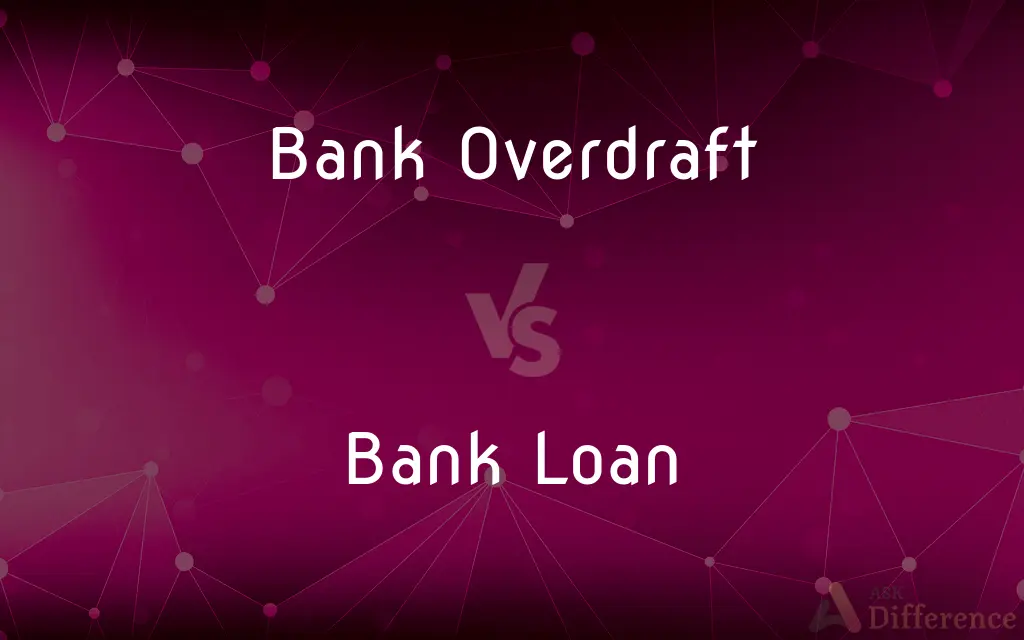Bank Overdraft vs. Bank Loan — What's the Difference?
Edited by Tayyaba Rehman — By Fiza Rafique — Published on January 13, 2024
A bank overdraft is a facility allowing you to spend more than your account balance, while a bank loan is a fixed amount borrowed that you repay over time with interest.

Difference Between Bank Overdraft and Bank Loan
Table of Contents
ADVERTISEMENT
Key Differences
A bank overdraft provides a customer the ability to withdraw more money than is currently available in their bank account. It's a form of short-term borrowing designed to cover temporary cash shortfalls. Bank loans, conversely, involve borrowing a set amount of money for a specified term with a repayment schedule. Overdrafts are often used for unexpected expenses, while loans are typically for significant, planned expenditures.
In the case of a bank overdraft, the flexibility is a significant aspect; customers can access additional funds up to a certain limit without a formal application each time. Bank loans do not offer the same flexibility. Once a loan is disbursed, any additional borrowing requires a new loan application and approval process. Overdrafts can be considered a 'pay as you go' option, whereas a loan is a long-term financial commitment.
The interest rates for bank overdrafts are generally higher compared to bank loans, reflecting the convenience and higher risk to the bank. Overdraft fees can also accumulate if the overdraft is not cleared promptly. Bank loans, however, have structured repayment plans with fixed or variable interest rates that are usually lower than overdraft rates. This makes loans more cost-effective for larger, long-term borrowing.
Another distinction lies in the security required. A bank overdraft may or may not be secured, but a bank loan, especially for larger amounts, typically requires collateral. This collateral mitigates the bank’s risk and can result in lower interest rates for loans. Overdrafts are usually not secured by specific assets but may be tied to the overall creditworthiness of the borrower.
Finally, bank overdrafts can be withdrawn and repaid continuously up to the agreed limit, providing ongoing access to additional funds. In contrast, once a bank loan is repaid, the account is closed, and accessing further funds would require going through the loan application process again. Therefore, overdrafts offer more immediate, albeit often more expensive, access to funds compared to loans.
ADVERTISEMENT
Comparison Chart
Definition
Temporary allowance to overdraw
Fixed sum borrowed
Flexibility
High, use as needed
Low, set terms
Interest Rates
Typically higher
Typically lower
Repayment Terms
Variable, as used
Fixed schedule
Security Required
Not always
Often required
Compare with Definitions
Bank Overdraft
A short-term financial provision from a bank.
The business used its bank overdraft to smooth out fluctuating cash flow.
Bank Loan
A contractual borrow of funds for long-term financing.
The entrepreneurs used a bank loan to fund their tech startup.
Bank Overdraft
A flexible, often unsecured, borrowing option.
She accessed her bank overdraft to navigate through a tight financial month.
Bank Loan
A sum of money borrowed from a bank with interest.
They took out a bank loan to finance their new home.
Bank Overdraft
Temporary borrowing when an account reaches below zero.
He relied on his bank overdraft to cover the unexpected car repair bill.
Bank Loan
An amount of money lent with collateral and interest.
They offered their house as collateral for the bank loan.
Bank Overdraft
A credit facility enabling withdrawals beyond account balance.
Her bank overdraft allowed her to pay for purchases despite insufficient funds.
Bank Loan
A financial agreement involving a repayment schedule.
The company secured a bank loan to expand its operations.
Bank Overdraft
An agreed limit of excess withdrawal from a bank.
Facing cash flow issues, they utilized their bank overdraft to manage payments.
Bank Loan
A debt provided by a bank to a borrower with set terms.
To start his business, he acquired a bank loan with a five-year term.
Common Curiosities
Is a bank overdraft a loan?
It's a form of credit, but not a loan in the traditional sense since it's typically used for short-term borrowing.
How do I repay a bank overdraft?
You replenish the overdrawn amount, often with added interest or fees.
What are typical repayment terms for a bank loan?
Regular, scheduled payments over a set period.
Is collateral required for a bank loan?
Often yes, depending on the loan type and amount.
Can I renegotiate the terms of a bank loan?
Sometimes, particularly if refinancing options are available.
Can I use a bank overdraft for any purchase?
Yes, within the overdraft limit.
Are interest rates higher for a bank overdraft or a bank loan?
Overdraft rates are typically higher due to their flexibility and risk.
Will repaying a bank loan improve my credit?
Consistent, timely repayments can improve your credit score.
What happens if I exceed my overdraft limit?
Banks may charge fees or higher interest, and it could affect your creditworthiness.
What is a bank overdraft?
It's a facility that lets you withdraw more than your account balance.
What is a bank loan?
It's a fixed amount of money borrowed from a bank, repaid over time with interest.
How quickly can I access funds with a bank overdraft?
Immediately, as long as you're within your overdraft limit.
How long does it take to get a bank loan?
It varies but usually requires an application and approval process.
What’s better for short-term financial needs, a bank overdraft or a bank loan?
An overdraft is generally better for short-term, while a loan is suited for long-term borrowing.
Does a bank overdraft impact my credit score?
It can if the account remains overdrawn for an extended period.
Share Your Discovery

Previous Comparison
NSE vs. BSE
Next Comparison
PCM vs. DPCMAuthor Spotlight
Written by
Fiza RafiqueFiza Rafique is a skilled content writer at AskDifference.com, where she meticulously refines and enhances written pieces. Drawing from her vast editorial expertise, Fiza ensures clarity, accuracy, and precision in every article. Passionate about language, she continually seeks to elevate the quality of content for readers worldwide.
Edited by
Tayyaba RehmanTayyaba Rehman is a distinguished writer, currently serving as a primary contributor to askdifference.com. As a researcher in semantics and etymology, Tayyaba's passion for the complexity of languages and their distinctions has found a perfect home on the platform. Tayyaba delves into the intricacies of language, distinguishing between commonly confused words and phrases, thereby providing clarity for readers worldwide.
















































